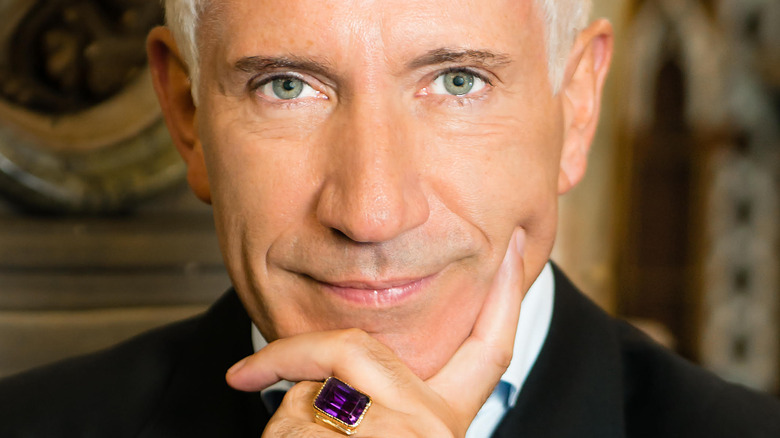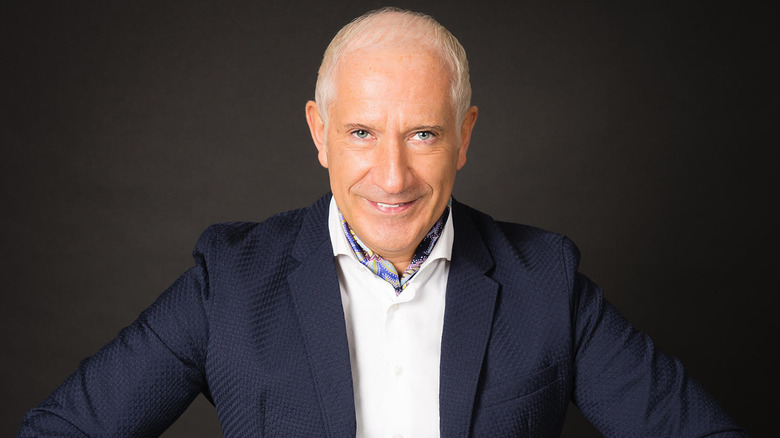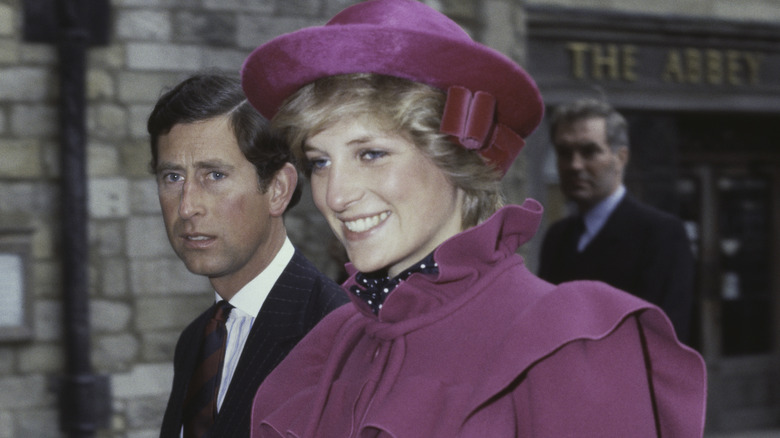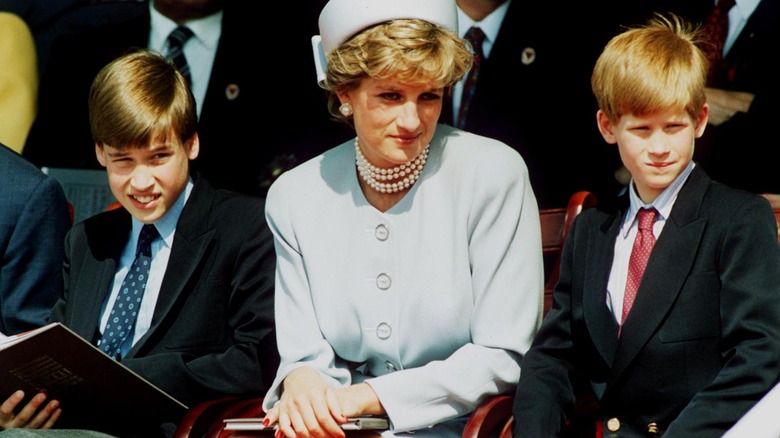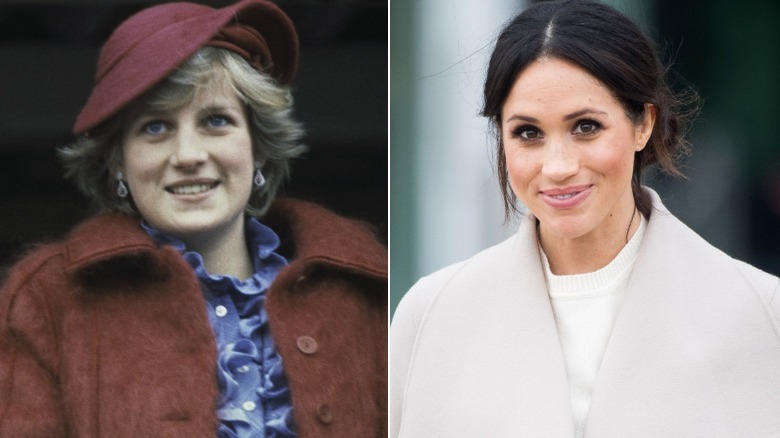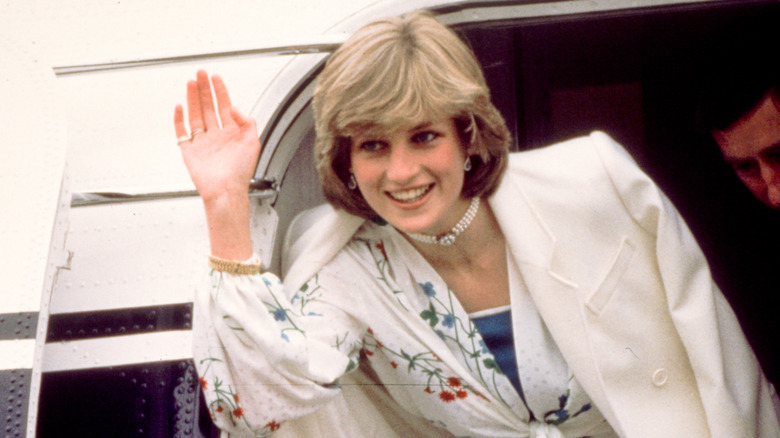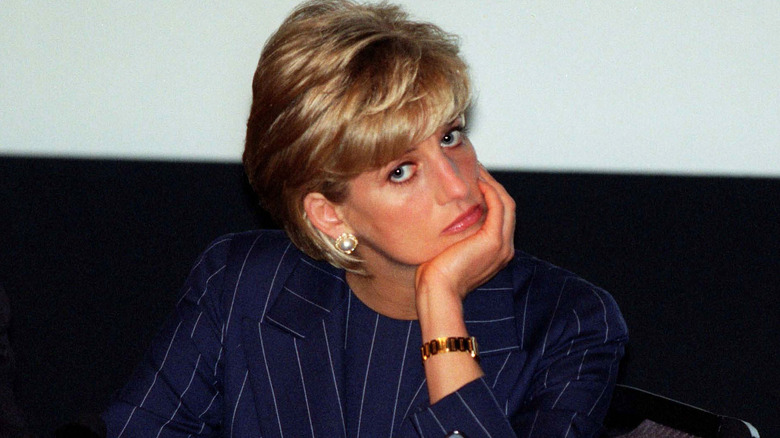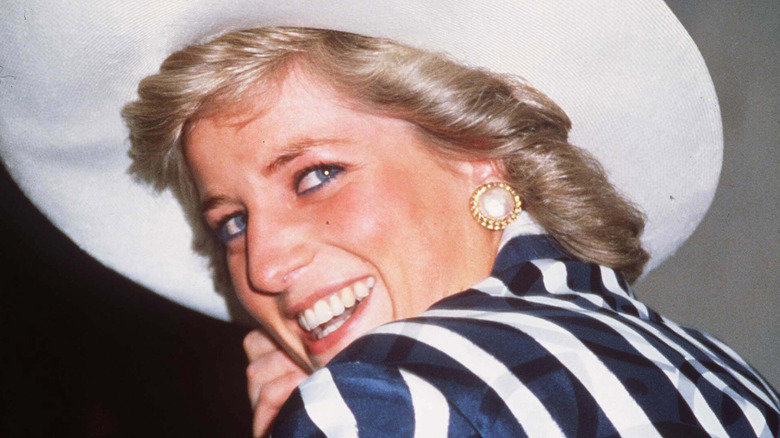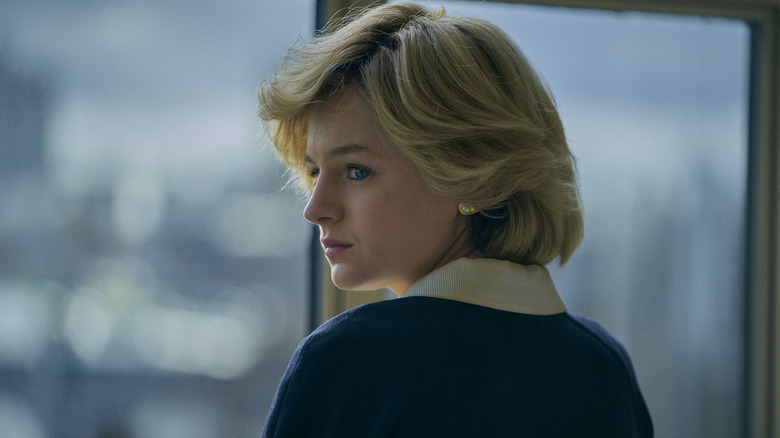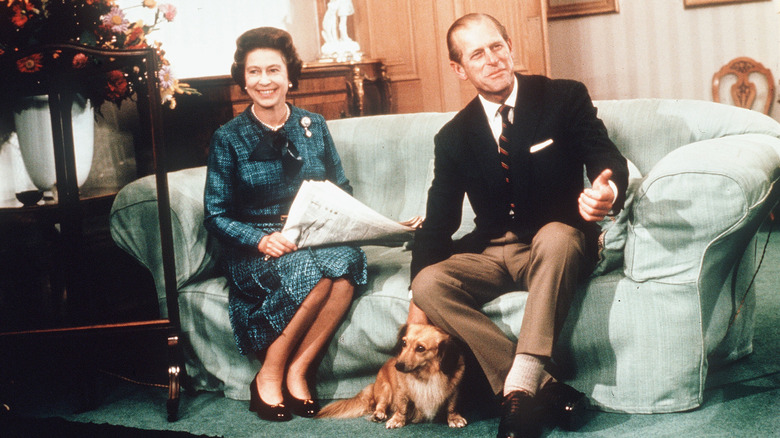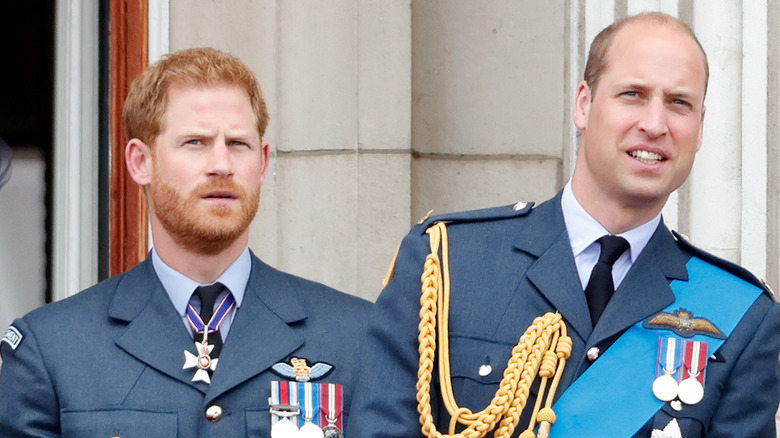Princess Diana's Vocal Coach Stewart Pearce Gives Us A Peek Inside The Royal Family - Exclusive Interview
We may receive a commission on purchases made from links.
In 1995, Princess Diana sat down in Kensington Palace to give her infamous interview with Martin Bashir. After more than a decade of royal life, the Princess of Wales had already become well acquainted with the spectacle that is the crown. She posed on the hospital steps with her newborn children, mere hours after giving birth. She fielded salacious tabloid rumors and headlines of affairs — on both sides — throughout her highly public marriage. By all accounts, Diana was a global celebrity and fashion icon, dubbed "The People's Princess" for her sheer popularity.
For Diana, the Bashir interview was meant to be a sigh of a relief, a bold moment of confidence where she finally admitted, "Well, there were three of us in this marriage, so it was a bit crowded." Instead, when she watched back the footage, she ended up seeing a woman who was less than self-assured. That's when she enlisted vocal coach Stewart Pearce.
For decades, Pearce has been teaching powerful women — including Hollywood actresses and literal royalty — how to use their voices with confidence. His new book, "Diana The Voice Of Change," serves as a close account of the late star's legacy, unveiling the person she was behind the palace gates, and how she used her voice to change her life, then ultimately the world.
In this exclusive interview, Pearce opens up about what royal life is like behind-the-scenes and the symbiotic, but frequently ruthless relationship between the tabloids and the royal family.
"Diana the Voice of Change" is available on June 15th via Amazon or bookstores everywhere.
Stewart Pearce reveals what it was really like working with the Princess of Wales
How did you start working with Princess Diana and what was it like?
Well, this was in 1995, so it was almost, as we see now, drawing to the end of her career. And the Martin Bashir video Panorama section had just come out. When Diana looked, when she reviewed what she saw on screen, although she relished the liberation of what she was saying, she didn't like the way that she looked. The way that you looked down and looked up through those rather, she called them panda eyes — very, very, very heavily made up eyes. She wanted to change the whole of her presence. She wanted something more confident, more assuring, more full of gravitas.
And so somebody that knew her very well was a patroness of mine. She was an extraordinary woman, this person I'm referring to. Alas, she's longer with us. And so she said, "Well, I think it would be really good for you to meet Diana." And I said, "Well, I don't think I can get involved in that." I mean, it wasn't that I wasn't honored. It's just the circus around Diana with all of the stuff that was going on and the paps and dah, dah, dah, dah, dah. And a lot of the work that I do, I work with some very, very powerful people in the world. So my service is completely confidential.
However, I was set up. I had lunch with this wonderful patroness and there was Diana. And she was extraordinary. I mean, she was just one of the most beautiful, easy, funny, life-affirming individuals that I'd ever met. I mean, she was just gorgeous. But it was obvious there was a lot that I could actually help her with to gain the confidence, to move from that very natural being that I met informally in the formal situation. Particularly, when she was asked to [publicly] speak, she felt terrified, and so I stepped in and helped.
Princess Diana told Stewart Pearce she was 'relieved' after the Martin Bashir interview
I actually wanted to ask you about [the Martin Bashir] interview, because that was a huge moment where she finally confirmed what was happening in her relationship, and that's been in the news now with a lot of controversy saying that he obtained the interview in a deceitful way. Do you think that she didn't want to give it? It sounded to me, and with what you just said, that she was relieved to finally get that weight off her chest, but what are your thoughts on it?
Well, in retrospect, there are two things going on. Firstly, obviously the interview we now know was obtained through treacherous means, deceitful means. So that's the first thing. But the second thing is that my experience of what Diana said to me confidentially was that she felt liberated by that interview. For the first time in a long while, she was actually able to corral all of those really important thoughts and say them to a confidential or sensitive witness in the form of Martin Bashir. I mean, it wasn't that confidential, because obviously it became broadcast all around the world. But the point is that he was deferential, he was kind, he was gentle, he was compassionate, he was easy, and they laughed a lot.
So she felt very, very easy about how she could, as I was saying, corralling those very important thoughts and letting them go like incendiaries. I mean, it was just extraordinary. But she felt revealed. She felt relieved. She felt liberated by that.
How Princess Diana changed the royal establishment
Did she ever talk to you about her relationship? Was [the interview] a thing that you feel opened the floodgates of, "Well now it's out there so I can say it," or was that the only time?
The actual interview was epoch-making, as we know, because for the first time a member of the royal establishment was being so candid about the way that she felt around a really dark area of her life, which was that the man that she was in love with was being unfaithful. It was very simple. So the very fact that she stepped forward and said it was really history making.
I mean that went down in the chronicles. Just as, for example, that when, much later on in '97 when she walked through those Angolan minefields, but actually post that reportage, 122 governments around the world renate on their policy in relation to [the] landmine issue.
Just as, for example, when she talked about her bulimia, 60,000 young women immediately contacted, forgive me, I can't remember the establishment, but it's like the Royal Psychiatric Association saying, "I've just seen Princess Diana, I also am bulimic. Help."
Stewart Pearce details the powerful parallels between Meghan Markle and Princess Diana
That's amazing, and we're seeing a lot of that now with the situation with Meghan and Harry. Because Meghan's been so open about her mental health struggle and the stuff that she's experienced having that fame, which, if you look at it, almost feels like what Harry was saying when he expressed fear of Diana's history repeating itself with Meghan. What do you think Diana would think about that? What do you think about that?
Oh, I think Diana would have been in full support. Absolutely full support, because they're both — both Diana and Meghan — are the voice of change, hence my book being called "Diana The Voice Of Change." They're intelligent, forthright women. I mean, obviously we can see with Diana that she was an intuitive intelligence. She didn't necessarily have the polished presentation quality that Meghan has developed over the years, largely as a result of being a very successful actress.
But no, I mean, I feel that they mirror one another in terms of the fact that they're vessels of change to help the women of the world to move forward into being able to speak about the tyranny and the deceit that they've experienced from the men in their lives. Whether it be their husbands or boyfriends or lovers or rapists or apropos #MeToo.
Or for example, in this case, the men who are actually controlling the royal establishment. This is not the royal family per se, this is actually the men in gray suits who, for example, Meghan approach[ed], saying, "Look, I'm having a real challenge with the fact that the press are vilifying me. And surely I can actually gain some help." And they, as it were, ignored her. Now that's the energy that needs to change. And I feel that both statements that Diana and Meghan made are the force that will bring about that mighty change.
Why Princess Diana wanted Stewart Pearce to write Diana The Voice Of Change
You've said Diana gave you permission to write your book. Can you tell me what she said about that — how she wanted this book to get out there?
Well, I mean, it was extremely en passant. It was the last time that I saw her, in July 1997, before she went off on holiday with Dodi [Fayed]. And she just, she was saying, "Oh, the work that we've been doing is so extraordinary." Because she was feeling courageous. She was feeling self-empowered. She was feeling confident. She was feeling beautiful. She was feeling radiant. And she said, "Wouldn't it be amazing if we could actually write this for the women of the world? But let's make sure we do it after Harry and William are married." And of course, Harry was 12 years of age at that time. So we weren't talking about let's do it tomorrow. It was just something that she passed, said in passing.
I had that in the back of my consciousness through the years. And then when #MeToo took place, and there I was serving a lot of really powerful Hollywood actresses who had been impaired grossly by what had taken place through the male seducers that they've met. But they were saying to me, "What do you think I should do? What ... " And I said, "You must step forward and speak about this, because this is outrageous that you were trifled with or you were abused in this way. And then the men are actually not being held accountable. We need to look into the whole vehicle of what gender equity is all about."
And of course, as we know, a number of them stepped forward, like Ashley [Judd], and the whole #MeToo process took off very precisely. So the book really comes as a result of the major stimulants that are taking place for social change in your lives, in the women of the world's lives.
Diana The Voice Of Change shows 'the whole substance of who Diana was in secret'
Who are some of the actresses that you've worked with recently?
Oh my God, I mean, so many, so many, so many. But also, I'm very faithful to them, because I have confidentiality agreements with all of them.
I wanted to ask you about a technique you developed called the Diana Heart Path that you mention in your book. Can you discuss that a little bit?
Well, the Diana Heart Path will be the project that will emerge when the book has been published. The book is published on June the 15th in the United States of America through a wonderful publishing company in New York City, which I'm very pleased about because I love the city. We're very determined and also very desirous of the book being a huge success, and there's no reason why it shouldn't be, bearing in mind the nature of the book. Because the book is really about the essence of who Diana was. It's not a repetition of some of the other books that have been written that are more like social diaries or chronicles of the times. This really enters into the whole substance of who Diana was in secret, so to speak. It begins with love and it ends with love. So it's a compilation of all of the essential exercises that we went through, all the experiences that we went through, that are psychophysical practices that the women of the world can use to literally develop or ignite radiance.
Diana The Voice Of Change came at exactly the right time for Stewart Pearce
That's just so amazing, and it's an important time for something like that.
Oh, it's just remarkable. I mean, I could— This is an answer to a dream as far as I'm concerned, because I've always wanted the nature of the confidential disciplines that are used with these extraordinary people to become more within the public domain. And we're living in an age of transparency and hey, it's happening.
I mean, I didn't plan this. Four years ago when I started getting the material together and writing it, I didn't know that this is what was going to go on. I mean, I didn't know that Harry and Meghan were going to make this bid for freedom. I didn't know that there would be a musical about Diana appearing on Broadway at the end of this year — we hope, when Broadway opens. I didn't know that there was going to be a series called "The Crown" four years ago.
So the dream of bringing this information forward is absolutely extraordinary. And many of the people who were supporting me ... are being very hopeful about how it will reach into the lives of very significant women in the United States, and I will be there to support it.
Stewart Pearce had to turn down a job on Netflix's The Crown
So you mentioned "The Crown." Have you watched it?
Oh, yeah.
What do you think about it?
Oh, it's a wonderful piece of drama. I mean, obviously much of the ipso facto detail has been slightly distorted for the drama that it is. And in fact, way back, which is some time ago now, I was asked if I would be the voice coach on the series. And I had a job on Broadway, and so I said, "No, I don't think so. No, I don't think so." So I put one of my ex-students into the role of voice coach. And of course now he's become this really celebrated voice coach as a result of "The Crown" and all of the people that have taken part, all the actors that have taken part have been in full receipt of his wonderful care. But he was calling me initially and saying, "What do I do about this?" and "What do I do about this?", because I have a particular insight into that life, because I was brought up in the royal family. My father worked for the Duke of Edinburgh.
Stewart Pearce on growing up with royals
What was that like being brought up in close proximity to royals?
Unusual, unusual because there was that level of privilege being a royal servant. But my mother was a very earthed individual, so she made sure that my brother and I also had experience of what the real world was all about so that we became very balanced, real individuals. Oh, it was extraordinary. And it particularly suited me because I was in awe and in wonder of the majesty and the heritage of the tradition of what monarchy is all about. Which of course has changed radically. I mean, I'm talking about a long time ago. I'm in my late 60s.
Was there anything shocking that when you were brought up that way you felt was normal that you look back now and were like, "Oh wow, that was strange."
No, not particularly because the age of innocence was still with us. Things have changed radically since the '50s and the '60s. It was a very, very different time, and when you look at some of those early newsreels, Pathé news, of the young queen and the young Duke of Edinburgh. I mean, there was sort of fairy tale beauty about them both. And the age of innocence was around, so we didn't have to think about things like security. We didn't have these things [iPhones] to take selfies with. So I don't have anything that was shockingly memorable of that time, no.
And it was extraordinary listening to my father because he was very, very close with Philip. They were of the same age. They were born two weeks apart. They met during the war in the Royal Navy, and my father would go away sometimes for six weeks or two months with him, and then he would come back and talk about climbing Machu Picchu and being an Acapulco and then a tiger shoot in India. And all of this was huge romance for we kids. I was really steeped in it. What we're seeing now, of course, is the temperament has changed radically with all of the great social changes that have taken place since the end of the '60s. That was a time of huge social revolution, and now progressively, in terms of what we were saying earlier about the agency of transparency.
Princess Diana's vocal coach sounds off on Prince Harry and Prince William's supposed 'royal rift'
Yeah, I think that's a big thing, and it makes people a lot less removed, so they can understand better and everyone can treat each other kinder — not that the tabloids are necessarily doing that.
Well, it's actually quite outrageous the way that the British press have taken odd facts and distorted them out of all proportion. I mean, for example, the rift between Harry and William, God's sake, they had a disagreement like brothers disagree. I had a disagreement with my brother the other day, but that doesn't mean to say that we're warring with one another. So the point is that after the declaration of the Martin Bashir deceitfulness last Friday, of course we saw the rift is no longer. Because the two boys came together and obviously they — the two men came together — they obviously shared what they were going to say and then presented it to the world, so as a unified front.
And you know what's wonderful, is that you guys in the States, you're so in support of the wonderful tenor of change that's taking place in the behavior of these people, which the British press is not. The British press is not actually seeing it from an archetypal point of view because obviously these individuals, we know they're like social ciphers by which the times can be read. What they're being measured by here is the personality rather than seeing the enormous changes that they're bringing about. For example, Harry's wonderful program with Oprah.
I just want to ask you, if you have a tip for someone who is public speaking for the first time and a beginner? Any blanket tip that you would give?
Yeah, breathe deeply and find stillness within, so that we ground.
"Diana the Voice of Change" is available on June 15th via Amazon or bookstores everywhere.

